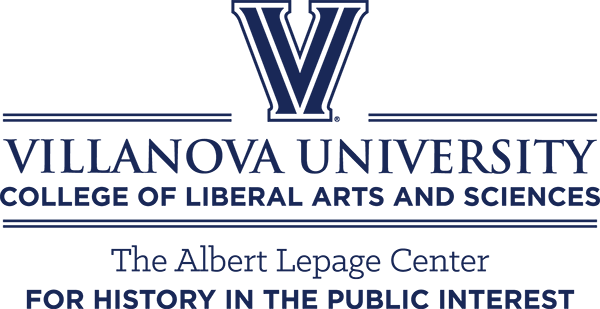Villanova University’s Lepage Center for History in the Public Interest to Invest in Coronavirus-Related Research and Scholarship

Center will promote COVID-19-related research, teaching, archives and community projects by local and national scholars
VILLANOVA, Pa. – Villanova’s Albert Lepage Center for History in the Public Interest is launching an initiative to fund research and projects related to the COVID-19 pandemic. With the help of a new gift from Albert Lepage ’69 CLAS, the Center will invest in local and national efforts—as well as those within the Villanova community—to engage the public in understanding the stories and effects of the global coronavirus pandemic. The goal is to fund researchers and students whose work brings historical perspective to, or advances understandings of, the COVID-19 virus and its ramifications around the world.
Founded in 2017 and housed in the College of Liberal Arts and Sciences, the Lepage Center is a multifaceted resource for students, teachers, industry, journalists and elected officials that draws upon the past to impart lessons for today’s world. It is made possible through the generosity of Mr. Lepage.
One initiative, the “Documenting COVID-19” collection project at Villanova University, is already underway. The Lepage Center is supporting Villanova’s Falvey Library’s effort to solicit stories, images, recordings and more from Villanova students, staff, faculty and alumni so that future generations will have original sources of information regarding the lives and times of Villanovans who experienced the global pandemic.
Other initiatives that will be considered are community outreach projects, grants to support COVID-19 historical research, funds that aid teachers at every level in the development and adaptation of courses that analyze all aspects—historical, political, financial, global, social, cultural, literary and more—of the pandemic, as well as projects that connect local and national journalists, the business community, and more.
“Our goal is to use these funds to help support scholars as they engage with the broad range of questions raised by the Covid-19 pandemic,” said public historian Jason Steinhauer, the Center’s director.
A History major at Villanova, Mr. Lepage made a $10 million commitment to the College of Liberal Arts and Sciences in 2016 to create a public-facing center devoted to history. It was the largest gift ever made to the College of Liberal Arts and Sciences.
“Future generations need to be able to access COVID-19 first-hand experiences in order to better understand its impact on the development of civilization,” said Mr. Lepage. “The Lepage Center’s initiative in this regard will add perspective to the history of the pandemic for generations to come.”
Led by Steinhauer and Elizabeth Kolsky, PhD, associate professor of History and interim faculty director, the Center engages the public, policymakers, scholars, teachers and students from history and other fields through academic programs, research, publications and events. In the past three years the Center has hosted historically informed and civic-minded conversations on the ‘fake news’ crisis, the U.S. Civil War, the Holocaust, the Cold War, the state of American Democracy, the fate of democracy around the world, and more.
The Center will fund up to ten projects that creatively engage with the broad range of questions, concerns, policies and practices raised by the study of how past pandemics have affected the course of history and how historical study further public understanding of the current COVID-19 crisis. Individual grant awards will range from $2,500 to $5,000. The deadline for proposals is August 15, 2020. For more information, please visit lepage.villanova.edu/covid-19.
About Villanova University: Since 1842, Villanova University’s Augustinian Catholic intellectual tradition has been the cornerstone of an academic community in which students learn to think critically, act compassionately and succeed while serving others. There are more than 10,000 undergraduate, graduate and law students in the University's six colleges—the College of Liberal Arts and Sciences, the Villanova School of Business, the College of Engineering, the M. Louise Fitzpatrick College of Nursing, the College of Professional Studies and the Villanova University Charles Widger School of Law. Ranked among the nation’s top universities, Villanova supports its students’ intellectual growth and prepares them to become ethical leaders who create positive change everywhere life takes them. For more, visit www.villanova.edu.
About Villanova University’s College of Liberal Arts and Sciences: Since its founding in 1842, Villanova University’s College of Liberal Arts and Sciences has cultivated knowledge, understanding and intellectual courage for a purposeful life in a challenging and changing world. With more than 40 majors across the humanities, social sciences and natural sciences, it is the oldest and largest of Villanova’s colleges, serving more than 4,500 undergraduate and graduate students each year. The College is committed to a teacher-scholar model, offering outstanding undergraduate and graduate research opportunities and a rigorous core curriculum that prepares students to become critical thinkers, strong communicators and ethical leaders with a truly global perspective.
